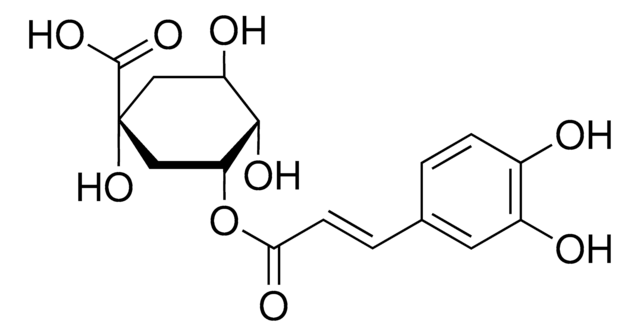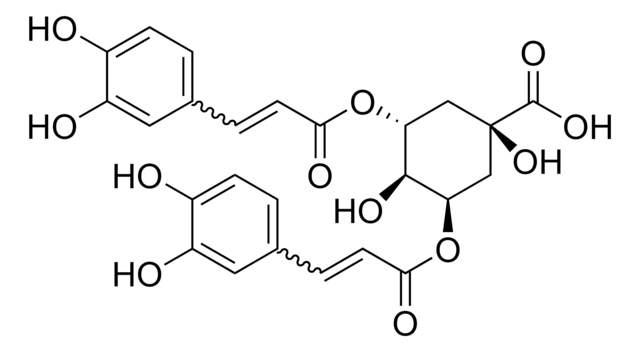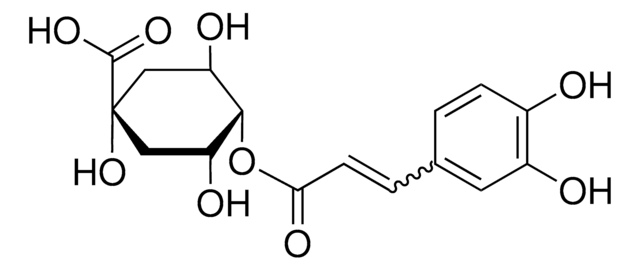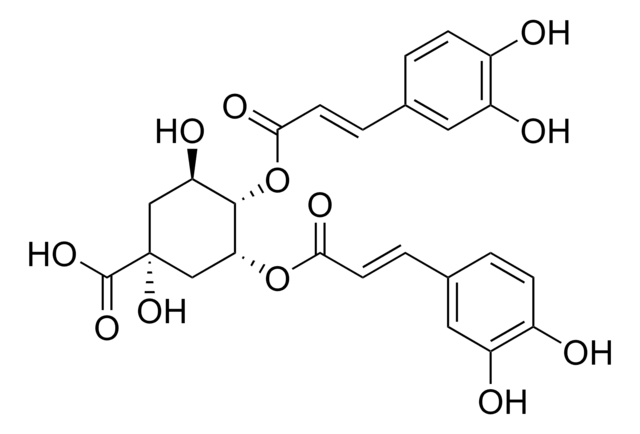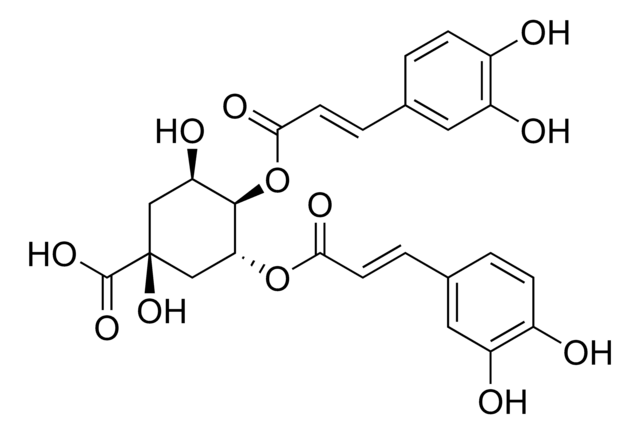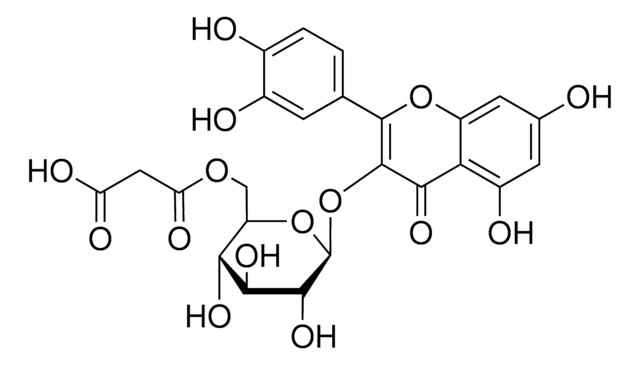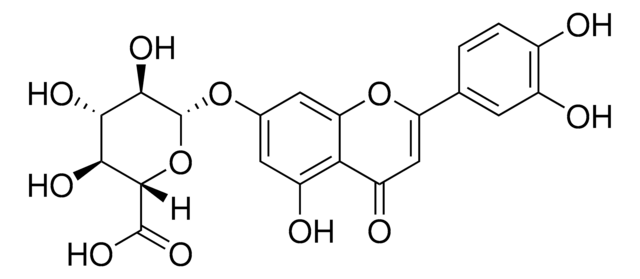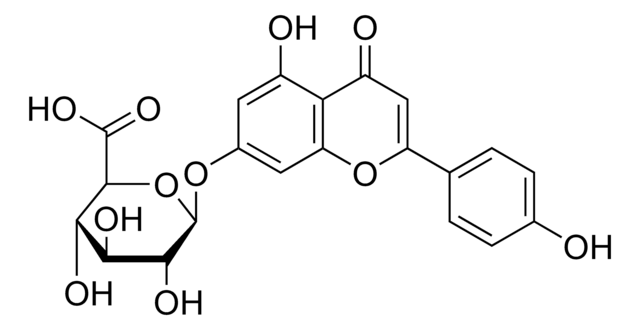SMB00131
3,5-Di-caffeoylquinic acid
≥95% (LC/MS-ELSD)
동의어(들):
3,5-DCQA, 3,5-Dicaffeoylquinate, 3,5-Dicaffeoylquinic acid, 3,5-O-Dicaffeoylquinic acid, Isochlorogenic Acid A
로그인조직 및 계약 가격 보기
모든 사진(1)
About This Item
실험식(Hill 표기법):
C25H24O12
CAS Number:
Molecular Weight:
516.45
MDL number:
UNSPSC 코드:
12352205
PubChem Substance ID:
NACRES:
NA.25
추천 제품
Quality Level
분석
≥95% (LC/MS-ELSD)
양식
solid
응용 분야
metabolomics
vitamins, nutraceuticals, and natural products
저장 온도
−20°C
SMILES string
O[C@H]1[C@@H](C[C@@](O)(C[C@H]1OC(=O)\C=C\c2ccc(O)c(O)c2)C(O)=O)OC(=O)\C=C\c3ccc(O)c(O)c3
InChI
1S/C25H24O12/c26-15-5-1-13(9-17(15)28)3-7-21(30)36-19-11-25(35,24(33)34)12-20(23(19)32)37-22(31)8-4-14-2-6-16(27)18(29)10-14/h1-10,19-20,23,26-29,32,35H,11-12H2,(H,33,34)/b7-3+,8-4+/t19-,20-,23-,25+/m1/s1
InChI key
KRZBCHWVBQOTNZ-PSEXTPKNSA-N
유사한 제품을 찾으십니까? 방문 제품 비교 안내
일반 설명
3,5-Dicaffeoylquinic acid is a phenolic acid found in the flower buds of Lonicera japonica Thunb. It has been used in pharmacologic, as well as food, and cosmetic research.
애플리케이션
3,5-Di-caffeoylquinic acid has been used as a reference standard for quantification of the phenolic compound of Artemisia species using high-performance liquid chromatography with diode array detection (HPLC-DAD). It has also been used as a reference standard to quantify the polyphenolic compounds found in Helianthus tuberosus L. (Jerusalem artichoke) using high-performance liquid chromatography-ultraviolet (HPLC-UV) technique.
생화학적/생리학적 작용
3,5-Di-caffeoylquinic acid exerts neuroprotective effects against in vitro retinal damage mediated by its antioxidant properties. It is a potent maltase inhibitor.
Storage Class Code
11 - Combustible Solids
WGK
WGK 3
Flash Point (°F)
Not applicable
Flash Point (°C)
Not applicable
가장 최신 버전 중 하나를 선택하세요:
시험 성적서(COA)
Lot/Batch Number
이미 열람한 고객
Sebastian E W Opitz et al.
Phytochemical analysis : PCA, 28(2), 106-114 (2016-12-23)
Coffee is a widely consumed beverage containing antioxidant active compounds. During roasting the phytochemical composition of the coffee bean changes dramatically and highly polymeric substances are produced. Besides chlorogenic acids that are already present in green coffee beans, melanoidins show
alpha-Glucosidase inhibitory activity by the flower buds of Lonicera japonica Thunb
Zhang Z, et al.,
Journal of functional foods, 5(3), 1253-1259 (2013)
Jiahui Chang et al.
Journal of ethnopharmacology, 194, 1032-1042 (2016-11-12)
Houshiheisan (HSHS), a classic traditional medicine prescription, has notable effects on patients with stroke AIM OF THE STUDY: To investigate the neurorestorative effects of HSHS on ischemic stroke and explore its mode of action. Focal cerebral ischemia models were induced
Dilem Tanriseven et al.
Food chemistry, 305, 125505-125505 (2019-10-14)
Shalgam is a beverage which is produced by lactic acid fermentation of black carrot juice. Two commercial methods (traditional method - TM and direct method - DM) used to produce shalgams were compared with respect to their effects on the
John Tung Chien et al.
Phytomedicine : international journal of phytotherapy and phytopharmacology, 49, 1-10 (2018-09-16)
Non-small-cell lung cancer (NSCLC) is known to exhibit resistance to various therapeutic agents and become progressively incurable. Taraxacum formosanum is a medicinal Chinese herb that has been clinically used in Taiwan. However, the investigations of the effects of whole plant
자사의 과학자팀은 생명 과학, 재료 과학, 화학 합성, 크로마토그래피, 분석 및 기타 많은 영역을 포함한 모든 과학 분야에 경험이 있습니다..
고객지원팀으로 연락바랍니다.